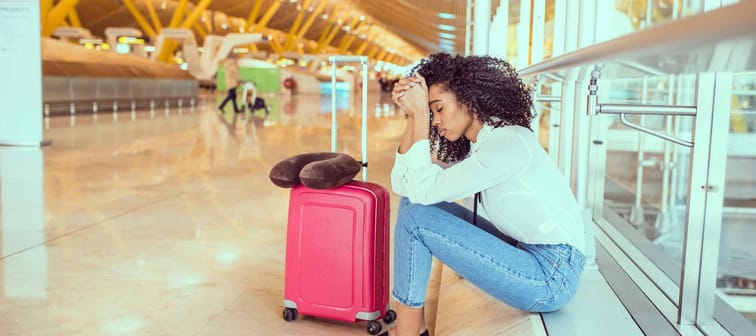Lost luggage
Your bags elected to go on a vacay without you? Check off the following:
- Alert the airline, both in person and in writing, of your missing bags. Remember the clock starts ticking immediately. After 21 days, the baggage is considered lost and the airline is liable for it and its contents.
- Contact the Canadian Transportation Agency (CTA), who will query the airline on your behalf and give them a 30-day deadline to respond.
- Usually the airline will resolve the issue, but if it doesn’t, or if you’re unsatisfied with the offer, the next level is mediation. Beyond that, the case could move to adjudication, a court-like process with a panel deciding on the outcome. On international flights, you have up to two years to file litigation.
If you expect a large payout, think again. Tariffs (air carrier contracts) limit the compensation amounts for “loss of, damage to, or the delay in delivery of baggage or other personal property.” In the case of Air Canada, the maximum payout is $1,500 per passenger in the currency of the country where the baggage was processed. To raise that limit, you can purchase a Declaration of Higher Value for each leg of the trip. The charge is $0.50 for each $100, in which case the payout limit is $2,500.
A new passenger bill of rights expected this summer would increase the maximum base payout to $2,100. This cap only applies to baggage lost, damaged or delayed on international (not domestic) trips.
In the event that your carrier does not compensate for lost luggage, or compensates very little, check to see if your credit card covers your luggage as part of a travel insurance policy. The Scotiabank Gold American Express® Card, for instance, offers up to $1,000 of compensation after only a 4-hour luggage delay.
If your flight is marked delayed for more than 30 minutes, approach the gate agent and politely request food and hotel vouchers to be used within the airport or nearby.
Delayed/cancelled flights
Different air carriers and jurisdictions have their own compensation policies when flights are delayed or cancelled. For example, under U.S. law, airlines have no obligation to compensate passengers when there’s a delay or cancellation. On the other hand, according to European Union rules, passengers may receive up to 600 Euros, even when travelling on a non-EU carrier.
Some air carriers, such as Air Canada, do not guarantee their flight schedules. They’re also not liable for cancellations or changes due to “force majeure” such as weather conditions or labour disruptions. If the delay is overnight, only out-of-town passengers will be offered hotel accommodation.
Nevertheless, many airlines do offer some compensation for the inconvenience. If your flight is marked delayed for more than 30 minutes, approach the gate agent and politely request food and hotel vouchers to be used within the airport or nearby.
In terms of cash compensation, the Canadian Transportation Agency (CTA) is proposing air passenger protection regulations that guarantee financial compensation to travellers experiencing flight delays and cancellations, with the level of compensation varying depending on the situation and how much control the air carrier had. The proposed regulations include the following:
- A plane must return to its gate after 3 hours on the tarmac.
- Minimum requirements will be set for procuring food, drink, lavatories, ventilation, and access to electronic communications during the delay.
- For larger airlines, payouts will range from $400 for a 3-6 hour delay, to $700 for 6-9 hours, and $1,000 for more than 9 hours. For smaller carriers the compensation would be $125, $250, and $500, respectively.
- Here’s the loophole: If the delay is related to the air carrier’s maintenance problems, no compensation is required.
The airline is obligated to complete the passenger’s itinerary. If the new ticket is for a lower class of service, the air carrier would have to refund the cost difference; if the booking is in a higher class of service, passengers cannot be charged extra. If the passenger declines the ticket, the airline must give a full refund, in addition to the prescribed compensation. For overnight delays, the air carrier needs to provide hotel accommodation and transportation free-of-charge. Again, if you are unsatisfied, the Canadian Transportation Agency may advocate on your behalf.
The full text of the proposed regulations can be reviewed here, and Canadian citizens have until February 20, 2019 to provide their input to the CTA.
Keep in mind that the travel insurance provided by some credit cards might offer compensation for flight delays for reasonable expenses, such as food, lodging, transportation, and other necessities. The Scotiabank Passport® Visa Infinite* Card has some of the best flight delay insurance in Canada, providing $500 worth of coverage after only a 4-hour delay.
Take the following steps to avail yourself of your credit card’s travel insurance compensation in the event of a delay:
- Approach the airline’s customer service department and request a statement detailing the cause of the delay.
- Document everything: Get screenshots of boarding passes, receipts, and any other items you deem relevant.
- Submit the claim as soon as possible even if the file is incomplete, otherwise you might forget to do it.
Bumped off the flight
Passengers get bumped because airlines overbook. When this happens, the air carrier must compensate you.
For international flights in the US, the rate is 200% of your one-way fare to your final destination, with a $675 maximum. If the airline does not make travel arrangements for you, the payout is 400% of your one-way fare to a maximum of $1,350. To qualify, you must check-in by the stated deadline, which on international flights can be up to 3 hours ahead. Keep in mind that if you accept the cash, you are no longer entitled to any further compensation, nor are you guaranteed to be rebooked on a direct flight, or similar type of seat.
Don’t be too quick to give up your boarding pass. Negotiate for the best compensation deal that would include cash, food and hotel vouchers, flight upgrade, lounge passes, as well as mileage points. But avoid being too greedy—if the gate attendant is requesting volunteers and you wait too long, you’ll miss the offer.
According to Air Canada’s tariff, if you’re involuntarily bumped, you’ll receive $200, in cash or bank draft, for up to a 2-hour delay; $400 for a 2-6 hours delay; and $800 if the delay is over 6 hours. (Air Canada was forced to raise its payouts in 2013 due to passenger complaints.)
The new rules would raise the payout significantly: $900 for up to 6 hours; $1,800 for 6-9; and $2,400 for more than 9 hours, all to be paid within 48 hours.
Statistically speaking, Delta Airlines is the carrier most likely to bump. Last year Delta raised its payout maximum to $9,950, while United Airlines tops out at $10,000.







